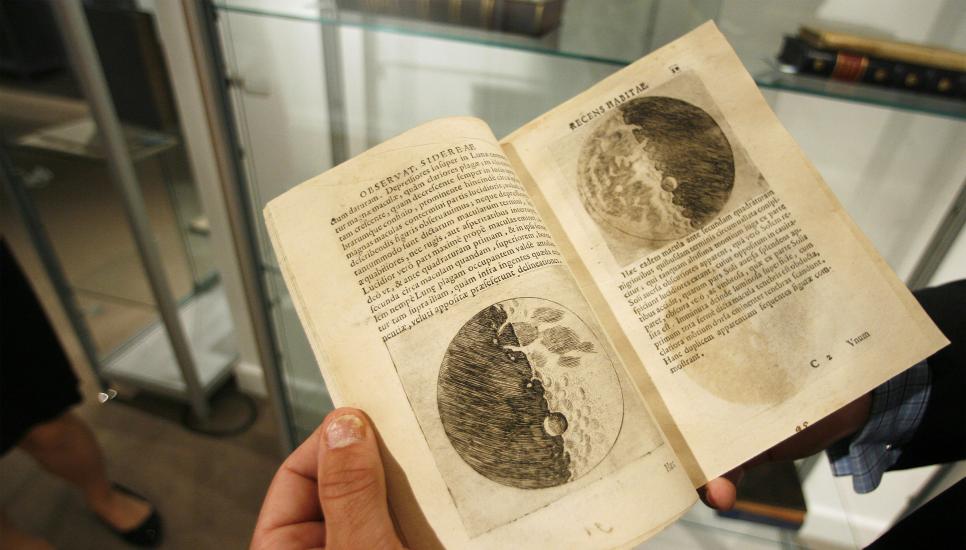Buy the book: the bibliophile's collectible

For almost a century people had walked through the library of one New England family every day without ever really thinking about the books on the shelves. Over generations a large collection of antique books had been accumulated, but had mostly remained in the library of the main family home.
“It was my great-grandfather's collection,” says the Massachusetts-based bibliophile, who chose to remain anonymous so that he could speak freely about his family's collection. “When I was in my early thirties I remember flicking through them and having the sudden realisation that they represented hundreds of years of thought.”
Over the course of a summer weekend's browsing, he quickly began to realise the significance of collection – both in terms of value and personal meaning.
“Our family business was originally in manufacturing and our great-grandfather – the founder – had quietly amassed a considerable collection of rare books about our industry. Some were first editions – many of them signed by the authors. Quite a few of them dating back to the 1700s. Our family had either never known about the collection or forgotten over the generations.”
The great-grandson, then working in the family office and now pursuing his own interests, felt drawn to the collection and began collecting himself. He began by cataloguing the library, finding out along the way that it wasn't insured for anything near its real value. He has since built on the collection considerably, keeping faithful to the same initial theme as his forebear.
“Caring for the same books as he did makes me feel much closer to my great-grandfather. I think it makes me more respectful of the legacy he created,” he says. “Building the collection further gives me great personal satisfaction and a feeling I am continuing that legacy.”
How then do books compare as a collectible? What is the market in first editions and rare books like? Can books be acquired for reasonable prices, or are they as astronomical as art?
One for the books
Based in New York, Thomas Lecky heads up the books and manuscripts department of auction house Christie's. He was a literature major in school and was always fascinated with books.
In any given year, Lecky might see several centuries of history pass across his desk, from a range of fields as diverse as children's literature, scientific texts, medieval manuscripts, French comics, or literary classics.
In his first year at Christie's, Lecky was contacted by an adviser who was working with a descendent of John Quinn, a renowned lawyer and collector in the late-19th and early-20th century. Quinn's descendent had in his possession a hitherto unknown manuscript of a section of James Joyce's Ulysses.
“The manuscript had been passed down through the family, yet no one else knew that it existed. It was a great 'working' manuscript, showing Joyce diligently changing, revising, and moulding his language. It was exciting to see this 'lost' manuscript.”
In 2001, Lecky was fortunate to be a part of the Christie's team that handled Jack Kerouac's manuscript for On The Road. “This is a touchstone piece of American literary history. To see it so informally for the first time in a casual situation was humbling.” And last year his team sold George Washington's annotated copy of the Bill of Rights. “It was a true privilege to work on it.”
In the book world, certain sales resonate more than others. The Cornelius Hauck collection was one such collection. The bibliophile had come from a German-American family of brewers that had called Cincinnati home since the mid-19th century. Between 1924 and his death in 1967, he amassed a collection of almost 4,000 books and manuscripts, dating from as early as the first century BC, all celebrating the book as an object, and containing many unique examples.
In 2006, Christie's received an inquiry from the Cincinnati Museum Center seeking to sell the Cornelius Hauck 'History of the Book' collection, as it was known. “The names and titles on the list they initially sent to us weren't much to go on. They weren't necessarily that interesting texts, either.” But as Lecky read through further, and when he and his colleagues at last flew out to Cincinnati to view the collection, his reserved manner turned to quiet excitement.
“It was widely known that Hauck had a great botanical book collection, but what was almost entirely unknown was that he had also amassed one of the most impressive collections that represented the book as an object. Hauck had items from the entire history of books – from Mesopotamian terracotta cuneiform cones, to medieval illuminated manuscripts, to a variety of exceptional examples of various forms of bindings throughout history.”
The result was an auction handled by Christie's, which contained more than 700 lots and fetched almost $12.5 million.
To Lecky, the Hauck collection exemplified how closely book collections reflect the personalities and interests of their owners: “Books are extremely personal and intimate objects which require a quiet contemplative relationship with them; that draws a certain type of person.”
Perhaps the embodiment of these themed bibliophiles is Jay Walker, inventor and founder of travel website priceline.com and high-tech think tank Walker Digital.
His Walker Library of the History of Human Imagination is a 3,600 sq ft private library in his Connecticut home. The house itself was designed around the library, which contains more than 50,000 volumes.
“I started an R&D lab and have been an entrepreneur. So I have a big affinity for the human imagination,” Walker said in a Wired magazine interview earlier this year. “About a dozen years ago, my collection got so big that I said, 'It's time to build a room, a library, that would be about human imagination.'”
His collection includes a 1493 Nuremberg Chronicle (which was the first illustrated history text), the first published surgical illustrations of the human body (circa 1500), a star atlas from the 1900s, and German-Dutch cartographer Andreas Cellarius' 1660 hand-painted celestial atlas. “It has the first published maps where Earth was not the centre of the solar system,” Walker told Wired. “It divides the age of faith from the age of reason.”
Like-minded bibliophiles also seem to gravitate towards each other. Buyers become sellers and sellers become buyers in a very symbiotic relationship, says Lecky. At Christie's, he sees both sides, often providing advice during a collector's lifetime and then subsequently helping executors and trustees of estates with large book collections. “Auction houses are open and available for anyone to come in and ask advice. We are happy to be a resource for anyone interested in collecting.”
That old book smell
Lecky says book collecting isn't usually something in which people simply dabble. Most book collectors who are successful are in it for the long haul.
Many serious collectors have their own particular agent, which they entrust to source items for them. As collections increase in size and value, collectors will often hire full-time librarians or curators.
Another famous bibliophile whom Lecky believes exemplifies a certain type of rare book aficionado was Helmut Friedlaender, the German-American lawyer and financial adviser.
“Helmut, who lived an extraordinary life into his mid-nineties, was intimately part of the process of selling his books right up until his death in 2008,” says Lecky. “Christie's originally handled the auction of his collection in 2001 but in his remaining years, Friedlaender would often track down items from the auction and repatriate them to his collection.”
Arguably, such behaviour might not have been the most financially savvy and efficient way for him to manage his collection (it's likely that financially he would have been better off donating the collection or allowing it to pass from his estate into a foundation) but it is a good illustration of the passion collectors have for their books.
“One reason collectors sell their books in their own lifetime is so that they have more control over the process of their distribution,” says Lecky. His work at Christie's goes far beyond the auctions for which the venerable house is famous. Lecky provides advice on acquisition, appraisal, and even collection management.
The value of the written word
Bibliophilia is a rather different state of mind from other types of collecting, like art. The book market does not operate like traditionally speculative markets, nor are books generally regarded as commodities. Are books assets? Yes. Do book collectors tend to think of their books that way? No. The mentality is different. Compared to art, the market is smaller and the values on individual items don't move as widely or dramatically in short periods of time.
Nevertheless, there have been some impressive movements in price for some volumes over the past few decades. In particular, there has been outpaced upward trends in books and manuscripts on technology and science – an area which has increased significantly in popularity with collectors. In 1978, a copy of De Revolutionibus Orbium Coelestium – in which Nicolaus Copernicus explained his model of the universe – went for $35,000. In 1993 a similar copy was sold for $135,000. And in 2008 a copy was auctioned at Christie's for $2.1 million. “Yet in the painting market, some items can double in a matter of a few years,” says Lecky. “Book prices are generally more consistent.”
Similarly, Bernard Shapero, owner of London-based Shapero Rare Books, has seen a recent trend towards landmark works of great thinkers or work-changing innovations.
“Books from the Renaissance and Enlightenment, as well as those of great philosophers – tomes which harkened the birth of the modern world – have become increasingly popular. Incunables [pre 16th-century European printed books] are also always in high demand.”
Yet as if to prove that value, like beauty, is in the eye of the beholder, Shapero notes that first editions of Adam Smith's Wealth of Nations has become an incredibly popular item amongst the business class: “This isn't a particularly rare book but it is terribly desirable. Hence it has recently tripled in price.”
Shapero's bookshop, just around the corner from Sotheby's auction house in London's genteel Mayfair, is a focal point for specialist collectors and new beneficiaries who find themselves in charge of a relative's collection, needing valuations for insurance purposes. He is often bringing collectors together, either by searching for particular tomes or selling items on conscription.
“Books don't often skyrocket in price, like the paintings of a new and exciting artist,” he says. “They're an asset which hold their value well and need to mature over time.”
Booking the help
Most serious collectors have their own particular agent, which they entrust to source items for them. In his role as chief fiduciary officer and head of family wealth at Wilmington Trust, Kemp Stickney has long experience helping clients who are serious collectors. He works with collectors, inheritors, and their specialist advisers.
“As their knowledge increases, often so does their specialisation, such as in a particular topic, publisher, author, or type of binding,” Stickney says. “The perceived value of the collection changes over time. Early on, value is not an issue for many collectors – they are just interested in finding a particular item. But as collectors get older, they often realize they have a lot of their net worth in their collections. They may not realise they have amassed such an asset class.”
Stickney often sets up separate limited companies for his clients' collections: “Structuring the collection as its own entity can help finance and manage the collection, as well as make it easier to deal with from an inheritance standpoint.”
Stickney says placing the collection in its own legal structure can be tax efficient, as well as decreasing the chances of the collection facing estate law complications which can arise from owning assets in different jurisdictions: “Often collectors have books and manuscripts across multiple locations – their main residence, summer home, city apartment – likely in multiple jurisdictions with differing trust and estate laws.”
The process of putting a collection into its own entity also forces collectors to conduct an inventory of their collections, providing a good understanding of the collection for conservation and insurance purposes.
“What will be the future of your collection? Are you giving it to your children, a charity, or setting it up as its own entity?” Stickney warns that if you haven't specifically made arrangements, at your death your executor must make decisions for you. “Keeping good records is paramount if you care what happens to your collection after you're gone.”
Stickney suggests some collectors might wish to name a protector for their collection, separate from the overall estate's principal trustee: “If your appointed trustee does not adequately understand the collection, you can direct them to an adviser to help execute your wishes, whether it be giving to a museum or library, setting up a foundation, or keeping it within the family.
“Collections represent a huge dollar value. Often this isn't how collectors think about them but this is exactly how the government considers the asset. In the US, estate tax is due nine months after death. This can be a weighty sum on large collections, requiring sudden liquidity.”
Stickney also advises collectors to be aware that the collection holds value that could affect the asset allocation of your portfolio. And that this is far easier to do if the collection is treated as a tangible asset, such as in its own legal entity.
Yet as Mark Twain put it, “In a good bookroom you feel in some mysterious way that you are absorbing the wisdom contained in all the books through your skin, without even opening them.” And for some collectors, that is all the satisfaction they need.






